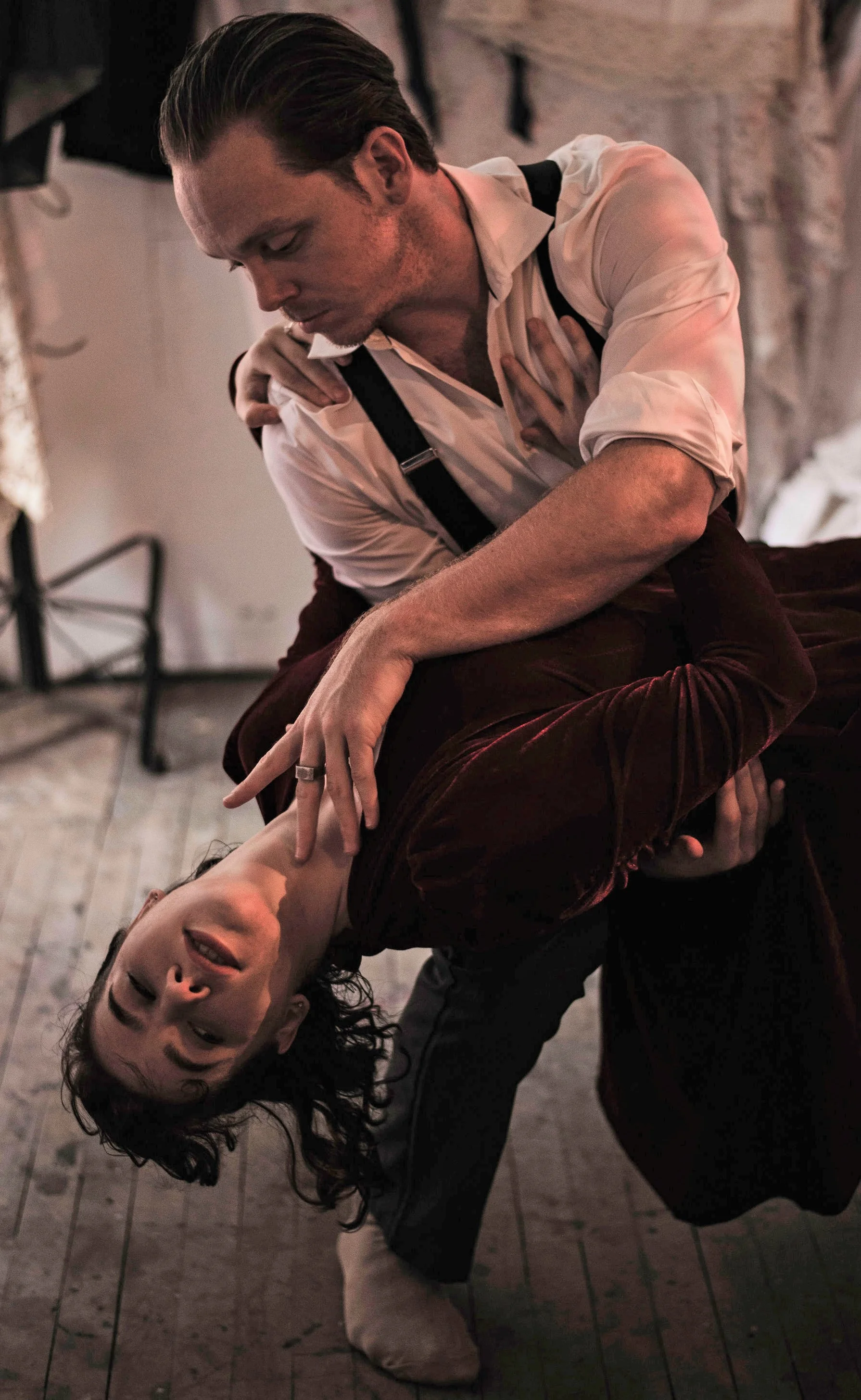During the Holocaust, the atrocities of the Nazi regime forced countless Jewish families and individuals into hiding. Though they were not interned in concentration camps, these stowaways were subjected to another, silent, reign of terror—in which every creak and cough could result in discovery, detainment, and almost certain death. Thus, the scene is set for The Hidden Ones, an immersive theater production that brings audiences into the secret hiding place of two families at the end of World War II. Even though the experience lasts just a little over an hour and plays out within the confines of a small room, The Hidden Ones is artistic proof that less is often more—especially in immersive theater.
The Girl’s Mother and Father (Marley Madding and Jay Stuart) steal a private moment for themselves wherein they relive the distant, bittersweet memory of their wedding. Top: The Boy’s Father and Mother (Chris Jumper and Monica Blaze Leavitt) struggle with the tremendous grief, fear, and stress of living in secrecy and silence.
Indeed, The Hidden Ones is most brilliant in its simplest moments, and one of its most profound experiential themes is how difficult it is to be quiet, especially under the tremendous pressure of fear and paranoia. An extremely intimate audience size allows for more personalized interactions with the characters (who are generically named: the Mother, the Father, etc.), while hardly a word is spoken throughout the performance. Silence is the rule, as exhibited in a participatory chess game between the Girl’s Father (Jay Stuart) and an audience member. At the beginning of the play, some audience members are silently invited to help the Girl’s Mother (Marley Madding) and the Boy’s Mother (Monica Blaze Leavitt) with domestic tasks, such as folding laundry and drying dishes; when trying to perform these everyday chores quietly, however, every clink and knock of the table becomes a dramatic event. These embodied interactions really drive home the unbelievable truth that some families lived like this for months or even years during the Holocaust.
Although the production is largely wordless and the characters are entirely nameless, The Hidden Ones manages to communicate a great deal through blocking and dance sequences. Anthony Logan Cole’s direction emphasizes small but recognizable family details, such as the Girl’s Father’s gentle caress and the apparent teenage irritation of the Girl (Rakel Aroyo) with her mother. Furthermore, with a dwindling supply of food, mealtime becomes a solemn, ceremonious, and mindful occasion: this is artfully highlighted by Whitney Sprayberry’s dinner-table choreography. Indeed, there are moments of joy studding their precarious lives: though they must do so in silence, the families still come together to celebrate the Sabbath, a symbolic reinforcement of their faith and familial bonds.
The set is also deceivingly versatile in its smallness, featuring a maze of bedsheets that can be drawn back to reveal small partitioned rooms where one-on-one encounters may take place. The intuitive design of the space is both functional and lived-in, which is a great testament to the talents of designer Braden Hooter. The crew (managed by Matthew Kennedy) was never visible and thus not a distraction from the theatrical world, and they executed lighting and sound cues without flaw.
The love between the Girl’s Mother and Father (Madding and Stuart) is a beacon of hope during dark times. Photographs by Kristin Pulido.
While silence is a powerful source of dramatic tension for this production, its musical score is less exacting in design. Many of the tracks feel derivative of the kind of cinematic (read: Hitchcockian) exaggerations of Punchdrunk’s Sleep No More. Other songs are of the time-period but in English, which is a distracting historical detail for a play set in Germany. In one romantic scene the Boy’s Father (Stuart) dances with his wife (Madding) in the kitchen; though the actors clearly define their relationship and execute the choreography with ease, it is unclear whether the song to which they dance is diegetic or perhaps just playing out in their shared imagination. On the other hand, the score provided a useful contrast to the moments of near-silence and also served to mask some of the noise from other floors in the building and the city streets of New York, just beyond.
Though it deals with some ugly subject matter, The Hidden Ones is a thing of beauty. A few of the silent one-on-one scenes last just a bit longer than comfortable, but even this is precisely designed to give audience members some small idea of the slow and painful march of seconds, minutes, and hours as these families waited out the war in uncertainty. Too often, Holocaust dramas steep their audiences in abstractions, hysterics, and disaster porn. The Hidden Ones is as much a play about the human experiences of fear, boredom, and tragedy as it is about affection, forgiveness, and grace.
The Hidden Ones plays through Dec 2. Performances are Wednesday through Sunday at 7 p.m. and 9 p.m., but there are none Nov. 21–23.) Running time is 65 minutes. The production is recommended for ages 16 and up. Exact location details are provided only after ticket purchase, via email. Tickets are $100, available at thehiddennyc.com.





